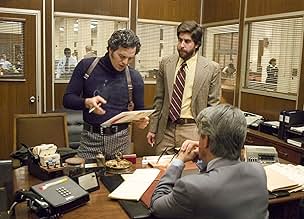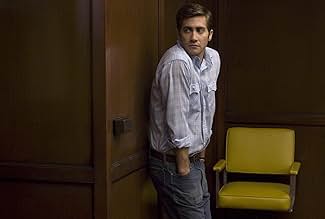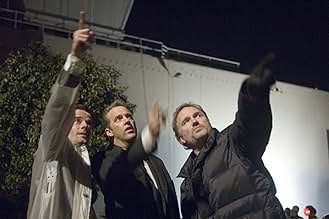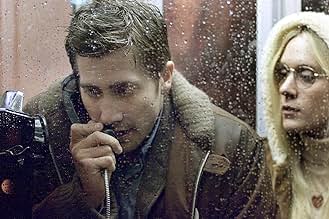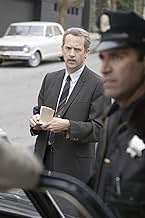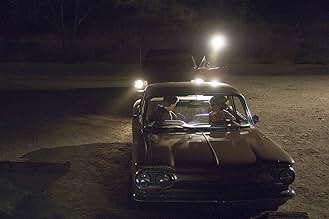Zodiac
Between 1968 and 1983, a San Francisco cartoonist becomes an amateur detective obsessed with tracking down the Zodiac Killer, an unidentified individual who terrorizes Northern California wi... Read allBetween 1968 and 1983, a San Francisco cartoonist becomes an amateur detective obsessed with tracking down the Zodiac Killer, an unidentified individual who terrorizes Northern California with a killing spree.Between 1968 and 1983, a San Francisco cartoonist becomes an amateur detective obsessed with tracking down the Zodiac Killer, an unidentified individual who terrorizes Northern California with a killing spree.
- Director
- Writers
- Stars
- Awards
- 3 wins & 71 nominations total
June Diane Raphael
- Mrs. Toschi
- (as June Raphael)
- Director
- Writers
- All cast & crew
- Production, box office & more at IMDbPro
Featured reviews
*This comment may contain spoilers, but I tried to be as vague as possible, and I think that this movie actually improves if you more or less know the ending.*
When David Fincher's ZODIAC opens with the year "1969" on the screen, a colorful wide angle shot of California, and a song from "Hair" on the soundtrack, we think we know what we are in for: an atmospheric historical epic. Then the film's first murder happens, and we are at the San Francisco chronicle with Jake Gyllenhall and Robert Downey, Jr., just recognizable enough under their period garb.
We see three other murders or almost-murders within the first 1 1/2 hours of this 2 1/2 hour movie, and they are terrifying in a way that few movie murders are: this is one of the only movies that succeeds at making you identify with the victims, and the murder scenes contain enough gore to be convincing but not so much gore that it becomes its own aesthetic, as in other Fincher films.
But ZODIAC is so long that eventually, the murders fail to keep our attention. The movie makes so many leaps through time and recounts so many investigations that lead nowhere, it is easy to forget that it began as an exciting movie.
One could easily argue that the movie has a right to be so uneventful because it is a "realistic" reflection of police procedure and of, well, reality. It is, but one can't help but think, With all the time-lapsing that goes on (it constantly jumps months ahead in the late '60s and early '70s, and then jumps from '73 to '77 to '83 to '91), why couldn't it skip more boring parts? The movie manages to be both too truncated and too thorough.
On a positive note, the digital cinematography by Harris Savides gives the film a consistently interesting look, which is something that many better movies don't have. He gives the film the signature "Fincher" look: saturated pastels in the daytime and a vague yellow-green tint at night. The movie is visually interesting without being calling too much attention to itself, but it's a shame that there's not enough to watch. The actors are sufficient, but the movie has no protagonist and we don't get to know anyone well enough - not even Robert Graysmith (Jake Gyllenhall), who becomes the de facto main character half way through.
The friendship between Graysmith and Paul Avery (Robert Downey, Jr.) - particularly a bar scene in which Graysmith introduces Avery to the merits of girly drinks - is interesting enough, but when Avery ceases to be a major character, we don't get enough of an indication that Graysmith has a life outside of his obsession with the Zodiac case. That may have been the point, but it doesn't work: there is nothing wrong with a plot that goes nowhere if the characters manage to hold our interest, but they don't hold our interest for all 2 1/2 hours, and the movie itself seems to lose interest in Graysmith towards the end. ZODIAC has no pay-off, which wouldn't be a problem if it weren't such a plot-driven film.
Still, it has its moments that nearly redeem it. It's a bit like a friend who tells long and meandering but enthusiastic stories: once you realize that his stories will always be too long, you can focus on the better parts. But his stories are still too long.
When David Fincher's ZODIAC opens with the year "1969" on the screen, a colorful wide angle shot of California, and a song from "Hair" on the soundtrack, we think we know what we are in for: an atmospheric historical epic. Then the film's first murder happens, and we are at the San Francisco chronicle with Jake Gyllenhall and Robert Downey, Jr., just recognizable enough under their period garb.
We see three other murders or almost-murders within the first 1 1/2 hours of this 2 1/2 hour movie, and they are terrifying in a way that few movie murders are: this is one of the only movies that succeeds at making you identify with the victims, and the murder scenes contain enough gore to be convincing but not so much gore that it becomes its own aesthetic, as in other Fincher films.
But ZODIAC is so long that eventually, the murders fail to keep our attention. The movie makes so many leaps through time and recounts so many investigations that lead nowhere, it is easy to forget that it began as an exciting movie.
One could easily argue that the movie has a right to be so uneventful because it is a "realistic" reflection of police procedure and of, well, reality. It is, but one can't help but think, With all the time-lapsing that goes on (it constantly jumps months ahead in the late '60s and early '70s, and then jumps from '73 to '77 to '83 to '91), why couldn't it skip more boring parts? The movie manages to be both too truncated and too thorough.
On a positive note, the digital cinematography by Harris Savides gives the film a consistently interesting look, which is something that many better movies don't have. He gives the film the signature "Fincher" look: saturated pastels in the daytime and a vague yellow-green tint at night. The movie is visually interesting without being calling too much attention to itself, but it's a shame that there's not enough to watch. The actors are sufficient, but the movie has no protagonist and we don't get to know anyone well enough - not even Robert Graysmith (Jake Gyllenhall), who becomes the de facto main character half way through.
The friendship between Graysmith and Paul Avery (Robert Downey, Jr.) - particularly a bar scene in which Graysmith introduces Avery to the merits of girly drinks - is interesting enough, but when Avery ceases to be a major character, we don't get enough of an indication that Graysmith has a life outside of his obsession with the Zodiac case. That may have been the point, but it doesn't work: there is nothing wrong with a plot that goes nowhere if the characters manage to hold our interest, but they don't hold our interest for all 2 1/2 hours, and the movie itself seems to lose interest in Graysmith towards the end. ZODIAC has no pay-off, which wouldn't be a problem if it weren't such a plot-driven film.
Still, it has its moments that nearly redeem it. It's a bit like a friend who tells long and meandering but enthusiastic stories: once you realize that his stories will always be too long, you can focus on the better parts. But his stories are still too long.
I have been highly interested and engrossed in the Zodiac killer story for the last 5 years now and I can say, without doubt, that this is the best and most accurate telling of the story. The film presents numerous details that were unknown to me before seeing it. All of these facts and theories are thrown together in a way that strings the viewer along, you think it's someone, then you get new information and that person is no longer a suspect. Fincher really puts you into the life of a detective working on the case. You feel just as excited when new information comes about and are equally disappointed when it leads to another dead end.
The film is beautifully shot (on VIPER digital cameras) and once again, Fincher shows us his wonderfully adept skills with CGI shots. All of the actors shine and truly become their characters. Jake Gyllenhall and Robert Downey Jr. put in excellent performances, as does Mark Ruffalo. I was also pleasantly surprised to see Phillip Baker Hall join the ensemble.
The only complaint I have heard that holds any water is that the film is too long. At roughly 2 1/2 hours, I can see how many would think that is long, but you have to realize that this is an intricate story with deep characters who need to be examined and understood. A standard 90 minute film, or even a two hour cut, would not have been able to tell the story as well. Character motivation and important details would have been left on the cutting room floor.
If you have followed the Zodiac case, you will be happy to see how well done this movie is. If you don't know anything about the case, you will be given an excellent story that will make you want to learn more about it. Regardless, you should do yourself a favor and see this movie. If nothing else, it's better than "Wild Hogs".
The film is beautifully shot (on VIPER digital cameras) and once again, Fincher shows us his wonderfully adept skills with CGI shots. All of the actors shine and truly become their characters. Jake Gyllenhall and Robert Downey Jr. put in excellent performances, as does Mark Ruffalo. I was also pleasantly surprised to see Phillip Baker Hall join the ensemble.
The only complaint I have heard that holds any water is that the film is too long. At roughly 2 1/2 hours, I can see how many would think that is long, but you have to realize that this is an intricate story with deep characters who need to be examined and understood. A standard 90 minute film, or even a two hour cut, would not have been able to tell the story as well. Character motivation and important details would have been left on the cutting room floor.
If you have followed the Zodiac case, you will be happy to see how well done this movie is. If you don't know anything about the case, you will be given an excellent story that will make you want to learn more about it. Regardless, you should do yourself a favor and see this movie. If nothing else, it's better than "Wild Hogs".
This is a movie about process. It's about what happens when a case goes cold and simple answers don't suffice. It's a risk taken when one does a fictional presentation of an historical event from fairly recent times. You can stick tot he facts or simply make things up. I enjoyed this film because the three principle characters were real and human. All were in over their heads to some extent. Jake Gyllenhaal character makes that sometimes unfortunate serendipitous discovery and becomes obsessed. The police have done what they can, but without passion and this is what Gyllenhaal's character brings to the game. Unfortunately, so much time has passed and so much has gone cold. So everything is based on circumstance. We must content ourselves with what we find and give up on confessions or witnesses. I knew from the start what the case was about and I recommend that those sourpusses that complain about this film do a little reading (maybe one paragraph on Wikipedia which should handle your attention spans) and then decide whether you want to bother with this. Personally, I thought the acting was superb and it painted a picture of the frustration with trying to solve a case with only bits and pieces.
On July 4, 1969, a killer shoots a couple on lovers' lane in Vallejo, California. The boy survives. The San Francisco Chronicle receives a letter from the Zodiac killer to print his letters with symbols. Reporter Paul Avery (Robert Downey, Jr) is on the case with the help of eager cartoonist Robert Graysmith (Jake Gyllenhaal). The brutal murders continue moving to San Francisco. San Francisco police detectives Dave Toschi (Mark Ruffalo) and William Armstrong (Anthony Edwards) are given the case. Other police include Jack Mulanax (Elias Koteas) in Vallejo and Detective Ken Narlow (Donal Logue) in Napa. Defense lawyer Melvin Belli (Brian Cox) appearing on TV gets a call from the supposed killer.
This starts off as an interesting serial killer mystery. The attacks are horrifically shown. The couple forced to be tied up and stabbed is probably the most memorable. However the movie turns into something deeper. This is not another serial killer movie like the endless TV shows that populate modern networks. It may not even be about the central characters. This is an immersive experience living with the serial killer always on the mind. The Zodiac killer is just out there in this world. It's fascinating in its dark undertones and the lack of flashiness.
This starts off as an interesting serial killer mystery. The attacks are horrifically shown. The couple forced to be tied up and stabbed is probably the most memorable. However the movie turns into something deeper. This is not another serial killer movie like the endless TV shows that populate modern networks. It may not even be about the central characters. This is an immersive experience living with the serial killer always on the mind. The Zodiac killer is just out there in this world. It's fascinating in its dark undertones and the lack of flashiness.
Zodiac, David Fincher's film about the impact the San Francisco Bay Area serial killer's case had on three primary characters is delivered with great attention to detail and proper pacing. Zodiac is not a film that uses or relies on suspended disbelief to succeed and does not attempt to compress five years of story into one in order to keep viewers interested. Instead it relies heavily on the facts and uses all of its 158 minutes to present them in almost linear form and staccato fashion.
Set primarily in San Francisco in the late 1960's and 70's (and eventually the 80's) Fincher's Zodiac takes no artistic license by adding the obligatory car chase scene down Russian Hill, drug enhanced evening in Haight-Ashbury or conspiracy oriented behind the scenes moves by City Hall. Instead the audience is presented with a credible story that portrays how stress, tension, frustration and fascination play upon the lives of S. F. Police Inspector David Toschi (Mark Ruffalo), S.F. Chronicle Editorial Cartoonist Robert Graysmith (Jake Gyllenhall), and S.F. Chronicle reporter Paul Avery (Robert Downey Jr.). Each of these people, as well as those surrounding them are operating well within the confines of every day life and the establishment. Fincher does not let Zodiac wander outside its central story, and therefore no editorial comment about the Vietnam War or similar events of the day are offered. Insights about the impact on the victims (who survive) or their families are only touched upon if they remain central to the story.
The initial scenes of the movie depict the killer in operation and they are not sugar coated. However, viewers wanting to see a film in the style of Fincher's Alien (3), Se7en or even Fight Club (i.e., blood and gore to almost surreal levels) should look elsewhere.
Zodiac is a well crafted production on all fronts. In addition to Fincher, the lead actors and extensive (and well known) supporting cast Zodiac producer's assembled a credible team. James Vanderbilt (Screenplay), David Shire (Score), Donald Burt (Production Design), Keith Cunningham (Art Direction), Victor Zolfo (Set Direction) and Casey Storm (Costume Design) all deliver quality work in their respective areas. There are no weak spots in this film. Zodiac may not (or attempt to) dazzle, but it does please.
Set primarily in San Francisco in the late 1960's and 70's (and eventually the 80's) Fincher's Zodiac takes no artistic license by adding the obligatory car chase scene down Russian Hill, drug enhanced evening in Haight-Ashbury or conspiracy oriented behind the scenes moves by City Hall. Instead the audience is presented with a credible story that portrays how stress, tension, frustration and fascination play upon the lives of S. F. Police Inspector David Toschi (Mark Ruffalo), S.F. Chronicle Editorial Cartoonist Robert Graysmith (Jake Gyllenhall), and S.F. Chronicle reporter Paul Avery (Robert Downey Jr.). Each of these people, as well as those surrounding them are operating well within the confines of every day life and the establishment. Fincher does not let Zodiac wander outside its central story, and therefore no editorial comment about the Vietnam War or similar events of the day are offered. Insights about the impact on the victims (who survive) or their families are only touched upon if they remain central to the story.
The initial scenes of the movie depict the killer in operation and they are not sugar coated. However, viewers wanting to see a film in the style of Fincher's Alien (3), Se7en or even Fight Club (i.e., blood and gore to almost surreal levels) should look elsewhere.
Zodiac is a well crafted production on all fronts. In addition to Fincher, the lead actors and extensive (and well known) supporting cast Zodiac producer's assembled a credible team. James Vanderbilt (Screenplay), David Shire (Score), Donald Burt (Production Design), Keith Cunningham (Art Direction), Victor Zolfo (Set Direction) and Casey Storm (Costume Design) all deliver quality work in their respective areas. There are no weak spots in this film. Zodiac may not (or attempt to) dazzle, but it does please.
Did you know
- TriviaThe murder victims' costumes were meticulously recreated from forensic evidence that was lent to the production.
- Goofs(at around 52 mins) One of the books Robert Graysmith has in 1969 has a barcode on the back. Barcodes did not even exist in any stores until the summer of 1974, and most items did not contain barcodes for several years after that.
- Quotes
Arthur Leigh Allen: I am not the Zodiac. And if I was, I certainly wouldn't tell you.
- Crazy creditsThe end text reads as follows: Following Mike Mageau's identification of Arthur Leigh Allen, authorities scheduled a meeting to discuss charging him with the murders. Allen suffered a fatal heart attack before this meeting could take place. In 2002, a partial DNA profile, that did not match Allen, was developed from a 33 year-old Zodiac envelope. Investigators in San Francisco and Vallejo refused to rule out Allen as a suspect on the basis of this test. In 2004, the San Francisco Police Department deactivated their Zodiac investigation. Today, the case remains open in Napa County, Solano County, and in the city of Vallejo, where Arthur Leigh Allen is still the prime and only suspect. Inspector David Toschi retired from the San Francisco Police Department in 1989. He was cleared of all charges that he wrote the 1978 Zodiac letter. Paul Avery passed away on December 10, 2000 of pulmonary emphysema. He was 66. His Ashes were scattered by his family in the San Francisco Bay. Robert Graysmith lives in San Francisco and enjoys a healthy relationship with his children. He claims he has not received a single anonymous call since Allen's death.
- Alternate versionsThe director's cut contains approximately 5 minutes of new footage, including:
- Melvin Belli (Brian Cox) talks about his Safari trip (when the Zodiac letter came to his house)
- Toschi (Mark Ruffalo) introduces himself to the Riverside Police Chief
- A new scene between Graysmith (Jake Gyllenhaal) and Avery (Robert Downey Jr.)
- A three-way conversation laying Leigh as a suspect to get a search warrant
- Extended audio montage (over a black screen)
- Plus extra bits of dialogue
Details
Box office
- Budget
- $65,000,000 (estimated)
- Gross US & Canada
- $33,080,084
- Opening weekend US & Canada
- $13,395,610
- Mar 4, 2007
- Gross worldwide
- $84,786,496
- Runtime2 hours 37 minutes
- Color
- Sound mix
- Aspect ratio
- 2.39 : 1
Contribute to this page
Suggest an edit or add missing content







